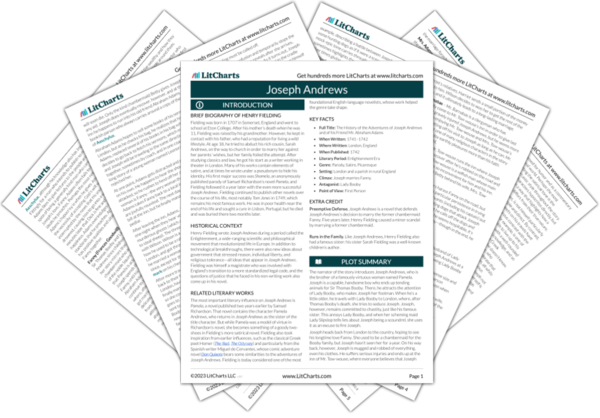Aside from Joseph Andrews himself, the most prominent character in Henry Fielding’s Joseph Andrews is a parson by the name of Abraham Adams. Adams is a complicated character; on one hand, he can seem hypocritically selfish, pretending to act like a charitable man when he’s actually living on the charity of others. Adams eats and drinks a lot but rarely has the money to pay his bills and so must rely on “loans” from acquaintances that he seems unlikely to pay back. The reader may interpret Adams’s personal behavior could as a parody of how many churches preach charity while relying on donations from members (and sometimes abusing these donations). But while many aspects of Adams’s character seem to critique the hypocrisy of organized religion, Adams also has positive qualities—in particular, his loyalty to looking out for the welfare of Joseph and Fanny.
While Adams is the most prominent example of a character who hypocritically preaches charity, many other righteous characters in the story also preach the benefits of generosity while failing to practice them in daily life. The parson Trulliber, who eats constantly without showing appreciation for his wife’s cooking, is another religious man who talks about charity but doesn’t demonstrate it. Another gentleman that Adams meets on the road outdoes Adams at his own game, promising Adams extensive hospitality at his home—only to then come up with an excuse to back out of his promises at the last minute. Notably, the pedlar, who is poor and has no religious education to speak of, is the most generous character in the story, lending Adams some money, and later going out of his way to save the life of Adams’s son, Dick. In Joseph Andrews, Fielding explores the difference between how religious people claim to be and the degree to which they actually embody Christian values, suggesting that virtues like charity are more often praised than practiced.
Religion and Charity ThemeTracker

Religion and Charity Quotes in Joseph Andrews
He was generous, friendly, and brave to an excess; but simplicity was his characteristick: he did, no more than Mr Colley Cibber, apprehend any such passions as malice and envy to exist in mankind; which was indeed less remarkable in a country parson than in a gentleman who hath passed his life behind the scenes [...]
His virtue, and his other qualifications, as they rendered him equal to his office, so they made him an agreeable and valuable companion, and had so much endeared and well recommended him to a bishop, that at the age of fifty he was provided with a handsome income of twenty-three pounds a year; which, however, he could not make any great figure with, because he lived in a dear country, and was a little encumbered with a wife and six children.
Joseph complained he was dry, and desired a little tea; which Barnabas reported to Mrs Tow-wouse, who answered, “She had just done drinking it, and could not be slopping all day;” but ordered Betty to carry him up some small beer.
Betty obeyed her mistress’s commands; but Joseph, as soon as he had tasted it, said, he feared it would increase his fever, and that he longed very much for tea; to which the good-natured Betty answered, he should have tea, if there was any in the land; she accordingly went and bought him some herself, and attended him with it.
As soon as he had seated himself, the stranger began in these words: “Sir, I do not care absolutely to deny engaging in what my friend Mr Barnabas recommends; but sermons are mere drugs. The trade is so vastly stocked with them, that really, unless they come out with the name of Whitefield or Wesley, or some other such great man, as a bishop, or those sort of people, I don’t care to touch.”
Adams was now gone some minutes, having insisted on Joseph’s beginning the journey on horseback, and Joseph had his foot in the stirrup, when the hostler presented him a bill for the horse’s board during his residence at the inn. Joseph said Mr Adams had paid all; but this matter, being referred to Mr Tow-wouse, was by him decided in favour of the hostler, and indeed with truth and justice; for this was a fresh instance of that shortness of memory which did not arise from want of parts, but that continual hurry in which parson Adams was always involved.
For as soon as the first tumults of Adams’s rapture were over he cast his eyes towards the fire, where Aeschylus lay expiring; and immediately rescued the poor remains, to wit, the sheepskin covering, of his dear friend, which was the work of his own hands, and had been his inseparable companion for upwards of thirty years.
Trulliber are heartily, but scarce put anything in his mouth without finding fault with his wife’s cookery. All which the poor woman bore patiently.
“Sir,” said the host, “I assure you you are not the first to whom our squire hath promised more than he hath performed. He is so famous for this practice, that his word will not be taken for much by those who know him.”
“Now, believe me, no Christian ought so to set his heart on any person or thing in this world, but that, whenever it shall be required or taken from him in any manner by Divine Providence, he may be able, peaceably, quietly, and contentedly to resign it.” At which words one came hastily in, and acquainted Mr Adams that his youngest son was drowned.











